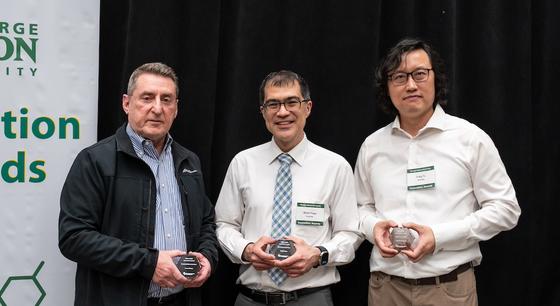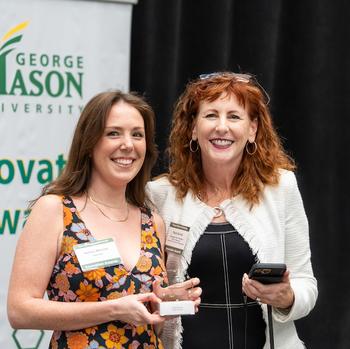In May, George Mason University celebrated its research enterprise with Innovation Awards. Hosted by the Office of Research, Innovation, and Economic Impact, the event recognized researchers, a start-up, and those who received and/or licensed a patent in the past two years.

“We're deeply committed to fostering a research environment that encourages innovation and supports discovery,” said Provost James Antony in his opening remarks. “We want to ensure that the faculty have the tools, the partnerships, and the resources that they need to take their ideas further.”
Antony also commended the researchers for mentoring George Mason students. “You set a powerful example for emerging scholars. You show them what it's like to be both a researcher and a changemaker.”
At the event, the university awarded its second Mason Lifetime Disclosure Award, which recognizes a researcher with the most innovation disclosures. The first recipient was Lance Liotta, codirector and cofounder of the Center for Applied Proteomics and Molecular Medicine (CAPMM). It was Liotta who presented this year’s award to his CAPMM cofounder and codirector Emanuel Petricoin.
Petricoin, who joined George Mason in 2005, is a cofounder of four life science companies: Theranostics Health Inc., Ceres Nanosciences Inc., C-4 Diagnostics Inc., and Perthera Inc. He also is a coinventor on 40+ patents and has published more than 350 peer-reviewed publications.

This year’s Mason Start-Up of the Year went to Mingkui Wei, an associate professor in the Department of Cyber Security Engineering, and his company CyberMirage. CyberMirage, which started as a collaborative research project involving researchers in network security with experts from both academia and industry, offers solutions to protect websites against web content theft and copyright infringement.
Three groups of researchers received George Mason Licensed Technology Awards, which celebrates when a protected intellectual property, such as a patent, is licensed by a company.
- Kathryn Laskey of the College of Engineering and Computing (CEC) and Paul Houser of the Geography and Geoinformation Science Department in the College of Science had their prototype system licensed by Global MapAid, a nonprofit working in Africa. The technology maps groundwater to help small farmers locate better wells and create soil conservation programs.
- Leading biotechnology tools provider Targeted Bioscience licensed a tissue collection method patented by the CAPMM team of Liotta, Alessandra Luchini, Marissa Howard, and biosciences PhD candidate Purva Gade.
- Toronto-based Affinity Diagnostics licensed a method for sequestering and/or isolating analytes of interest from an oral fluid, also developed by a CAPMM team. Researchers Ahana Byne, Fatah Kashanchi, and Kelsey Mitchell joined Luchini, Liotta, and Howard on this award.
The Office of Research, Innovation, and Economic Impact also gave out Innovator Awards in the categories of sustainability, biohealth innovation, and digital innovation.
CEC’s Lance Sherry was recognized with the Innovators Award in Sustainability for his work with contrail mitigation. His pioneering research and technologies have not only enhanced flight safety and operational efficiencies but have also addressed aviation's growing efforts to track and mitigate the environmental impacts and to quantify their CO2 equivalency.
The College of Science’s Mikell Paige was recognized with the Innovators Award in Biohealth Innovation for his groundbreaking work in biochemistry at the interface of synthetic organic chemistry, drug discovery, and molecular design. His work focuses on designing small molecules that target computational modeling and biochemical assays to produce drug development in meaningful and practical ways.
Craig Yu of the College of Engineering and Computing received the Innovators Award in Digital Innovation for developing groundbreaking systems that redefine how people interact with virtual and augmented spaces. Through his research, Yu has developed a more human-centered approach to navigation, designing digital pathways that take into account physical effort and make virtual experiences more natural and inclusive.
“At George Mason, we’re not just advancing research—we’re building a culture of innovation that has real-world impact,” said Andre Marshall, vice president for research, innovation, and economic impact. “These awards are about honoring the bold ideas and the committed people who move the university’s research forward—and outward—into the world. They represent the spirit of innovation that defines our university: impactful, collaborative, and driven by a desire to make a difference far beyond our campus.”
The awards the researchers took home for patents and licensed technologies have a special design. They are Plexiglas hexagons with magnets so researchers can add to their award over the years as they receive patents/licensing.
The researchers and teams behind 19 George Mason patents were also recognized.
- Compositions and methods for laser capture microdissection—Virginia Espina, Lance Liotta, and Alessandra Luchini
- Collapsible fluid collection system for point-of-care diagnostics—Marissa Howard, Liotta, Luchini, and Kelsey Mitchell
- Honey proteomics for honeybee disease and environmental biomonitoring—Liotta and Luchini
- Antimicrobial peptides and related methods—Shravani Bobde
- Molecularly imprinted particles—Barney Bishop, Mrinalini Ramanan, and Yaling Zhu
- Systems and methods for coordinating travel through traffic lights—Melvin Friedman and Brian Mark
- Impactor platform allowing freefall upon impact—David Cerri
- Recombinant host cell with heterologous nucleic acids encoding SHREK proteins—Deemah Dabbagh and Yuntao Wu
- Methods for breast cancer treatment—Emanuel Petricoin and Julia Wulfkuhle
- Anti-fibrotic agent—Mikell Paige and Gregory Petruncio
- Using Wi-Fi infrastructure to predict locations and contacts—Janusz Wojtusiak
- Methods and systems for system call reduction—Kun Sun
- Systems and methods for improved aircraft safety—Lance Sherry
- Exertion-aware path generation—Lap-Fai (Craig) Yu
- Complex user authentication factor integrating a sequence of fingerprints and a personal identification number—Massimiliano Albanese
- Small molecule inhibitors of SLC25A1—Mikell Paige
- Mining all atom simulations for diagnosing and treating disease—Mohsin Jafri
- Antimicrobial peptides and related methods—Monique van Hoek
- Look-up table containing processor-in-memory cluster for data-intensive applications—Sai Manoj and Sathwika Bavikadi
Related Stories
- June 26, 2025
- March 10, 2025
- March 3, 2025
- September 26, 2024
- George Mason agricultural tool is another step closer to helping U.S. farmers, thanks to NSF supportAugust 13, 2024
